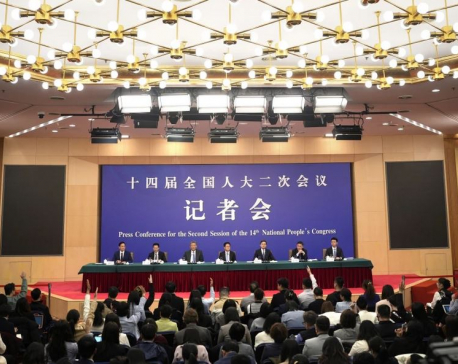
OR
Opinion
The Great Resignation: A Workers’ Revolution and Its Economic Impact
Published On: April 29, 2022 06:30 AM NPT By: Kanchan Rauniyar


Kanchan Rauniyar
The author is an assistant manager at the Operation Department of Nepal Bank Limited.news@myrepublica.com
Since it seems that high staff swirl is going to reside now for a while, the existing companies should reengineer their retention strategies.
The view that the pandemic has induced the masses to quit their jobs has been the buzz of the news and the networking sites, but the question is whether the data really holds up? Or is it an influence from the big economies like the USA, the UK and such? The figures differ from country to country; big economies such as the USA, the UK, China, India and such surfaced with varied numbers. The major setback was for the USA, as 4.2 million Americans called it quits and are reluctant to get back to work as they reassess their priorities in life. Out of this 4.2 million, only half returned to their work stations. This wave definitely got carried onto the Asian economies and swayed over the big economies like China, India.
The trend of exodus has reached the Asian economy such as the Indian market experienced loss of employees since more and more resignations were turned up. TCS found that 43000 staff resigned and the attrition rate was relatively low. Work from home has definitely become a preference. For china, the idea of lie flat / tang ping (in Chinese) became the buzz, the momentum when the Chinese started to give work the second priority as COVID-19 surfaced and the work group got tired of working flat out and wants to lie flat enjoying reading a book or sitting down watching a movie. Basically, simplifying their life. This lying flat tendency is what the Europeans, Americans have termed as ‘the Great Resignation’.
They say history repeats itself and historians repeat each other. In 1919, the Spanish Flu dwindled and the workers pulled out of their jobs and a positive career transition has been traced thereon. The thesis of the Great Resignation is deemed to have stronger roots in America and Britain. The Resignation effect is not necessarily negative, rather it might be a boon boosting entrepreneurism and healthy lifestyle; the data shows the evidence with a major boost in the increase in the start-ups and some of them acing the unicorn charts. Not instantly, but in the long run it all will have a positive impact on the economic sector of the countries.
Year 2021 convoluted the world of work and led the path to “The Great Resignation”. The word was coined by Professor Anthony Klotz (Texas A&M University, USA). The Great R word is elastic, refurbishing the labor force and basically, the “Quits” is accelerating. The pandemic around this time particularly in 2021 impacted the economy with the Great Reset and the Great Reshuffling in basic terms of life. With people thrusting the families into a homebound lifestyle with added up screen time and online streaming to the rise of DIY (Do It Yourself) family and presenting a new way of things. The digitized business services have surged since the pandemic hit all over the world. The big names like Twitter have allowed its workers to permanently work from home. While companies like TESLA have changed their headquarters, these Great Reshuffles are bringing in the better-job revolution. The wave started with the beginning of COVID-19 pandemic which made people rethink their priorities in life profoundly.
Dr Klotz stated that the thought process of people since the pandemic has wired them to think about how their life is going and have had some epiphanies and decided some changes to their lives. With the thought of moving to a new job, working from home, being with family members and pursuing the new interests to retiring early, the priorities are being shifted. The data of the USA in November of 2021, showed that the percentage reached to 3% compared to that of an average of 2% before the pandemic.
The Great resignation has been routed for the “The Great Reimagination” and also “The Great Realization”. The idea has shifted to making decisions about the personal pace and relationship rather than just sticking to workplace and workforce issues. The chronicles of The Great Resignation have made us think what’s behind this and whether it is here to stay? The enforced WFH has now become a preference and not only an emotionally driven decision that surfaced out of panic, which covered up only a small percentage; this shows that the quits is for real, but with some perks. The economy is accelerating with new businesses in the pipeline breaking the vicious circle and deemed to boost the economy with new investments and innovations.
Since it seems that high staff swirl is going to reside now for a while, the existing companies should reengineer their retention strategies. The management now needs to be intentional rather than relying in the old ways when the new generations used to adapt the work culture permeable. And the unicorns are set to bring in new jobs in the market and accelerate the economic environment in a more eased manner as they demand resources including the tangibles and the intangibles such as the money, the manpower and the skills.
Nepal, has had an abrupt downfall in its economic activities since the mid of 2019 caused by lockdown. The immediate effect then underpinned the unemployment and loss of jobs. Approximately 3.7 million workers were at risk and about 1.3 million jobs were disrupted, resulting in loss of jobs, reduced wages and pushing the economy backward. Currently, the economic growth rate of the country is set at 6.5 percent. But the international organizations have mapped out the figures to be at 4.7 percent, a slightly better scenario in comparison to 2021. Basically, the least developed and developing countries have a major economic backlash and need to accelerate the decision-making processes.
You May Like This

China says economy got a strong start in 2024, sets sights on latest technology, upgrading factories
BEIJING (AP) — China has plenty of room to maneuver to attain its annual target for robust economic growth of... Read More...

Finance minister makes a diagnosis of economy
Slams privatization of public enterprises ... Read More...

Blockade institutionalized ‘black economy’: Experts
KATHMANDU, June 20: Experts said Monday that the five month long blockade not only fueled the black economy and corruption but... Read More...





Just In
- MoHP cautions docs working in govt hospitals not to work in private ones
- Over 400,000 tourists visited Mustang by road last year
- 19 hydropower projects to be showcased at investment summit
- Global oil and gold prices surge as Israel retaliates against Iran
- Sajha Yatayat cancels CEO appointment process for lack of candidates
- Govt padlocks Nepal Scouts’ property illegally occupied by NC lawmaker Deepak Khadka
- FWEAN meets with President Paudel to solicit support for women entrepreneurship
- Koshi provincial assembly passes resolution motion calling for special session by majority votes






_20220508065243.jpg)






Leave A Comment